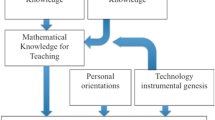Abstract
In 1997, an interview-based study of 70 research mathematicians was undertaken with a focus on how they ‘come to know’ mathematics, i.e. their epistemologies. In this paper, I discuss how these mathematicians understand their practices, locating them in the communities of which they claim membership, identifying the style which dominates their organisation of research and looking at their lived contradictions. I examine how they talk about ‘knowing’ mathematics, the metaphors on which they draw, the empiricist connections central to the work of the applied mathematicians and statisticians, and the importance of connectivities to the construction of their mathematical Big Picture. I compare the stories of these research mathematicians with practices in mathematics classrooms and conclude with an appeal for teachers to pay attention to the practices of research mathematicians and their implications for coming to know mathematics.
Similar content being viewed by others
REFERENCES
Boaler, Jo: 1996, 'Learning to lose in the mathematics classroom: a critique of traditional schooling practices in the UK', Qualitative Studies in Education 9 (1), 17–33.
Boaler, Jo: 1997, Experiencing School Mathematics: Teaching styles, sex and setting, Open University Press, Buckingham.
Burton, Leone: 1995, 'Moving Towards a Feminist Epistemology of Mathematics', Educational Studies in Mathematics 28, 275–291.
Burton, Leone: 1996, 'Mathematics and its Learning, as Narrative — A Literacy for the Twenty-first Century', in Dave Baker, John Clay and Carol Fox (Eds.), Challenging Ways of Knowing In English, Maths and Science, Falmer Press, London.
Burton, Leone (Ed.): 1999, Learning Mathematics: from Hierarchies to Networks, Falmer Press, London.
Burton, Leone and Morgan, Candia: (forthcoming), 'Mathematicians Writing'.
Cockcroft, W. H.: 1982, Mathematics Counts, HMSO, London.
Daly, Mary: 1997, From the Experiencies of Women Mathematicians: A Feminist Epistemology for Mathematics, Doctoral Dissertation, Massey University, New Zealand.
Hadamard, Jacques: 1954, The Psychology of Invention in the Mathematical Field, Dover, New York.
Keys, Wendy and Cres, Fernando: 1993, What do students think about school? NFER, Slough, Bucks.
Lave, Jean and Wenger, Etienne: 1991, Situated Learning: Legitimate Peripheral Participation, Cambridge University Press, Cambridge.
Miller, Carol: 1995, 'In-depth Interviewing by Telephone: Some Practical Considerations', Evaluation and Research in Education 9 (1), 29–38.
Poincaré, Henri: 1913, 'Mathematical Creation', The Foundations of Science, trans. by G. Bruce Halsted, The Science Press, New York.
Polanyi, M. and Prosch, H.: 1975, Meaning, University of Chicago Press, London.
Author information
Authors and Affiliations
Rights and permissions
About this article
Cite this article
Burton, L. The Practices of Mathematicians: What do They Tell us About Coming to Know Mathematics?. Educational Studies in Mathematics 37, 121–143 (1998). https://doi.org/10.1023/A:1003697329618
Issue Date:
DOI: https://doi.org/10.1023/A:1003697329618




